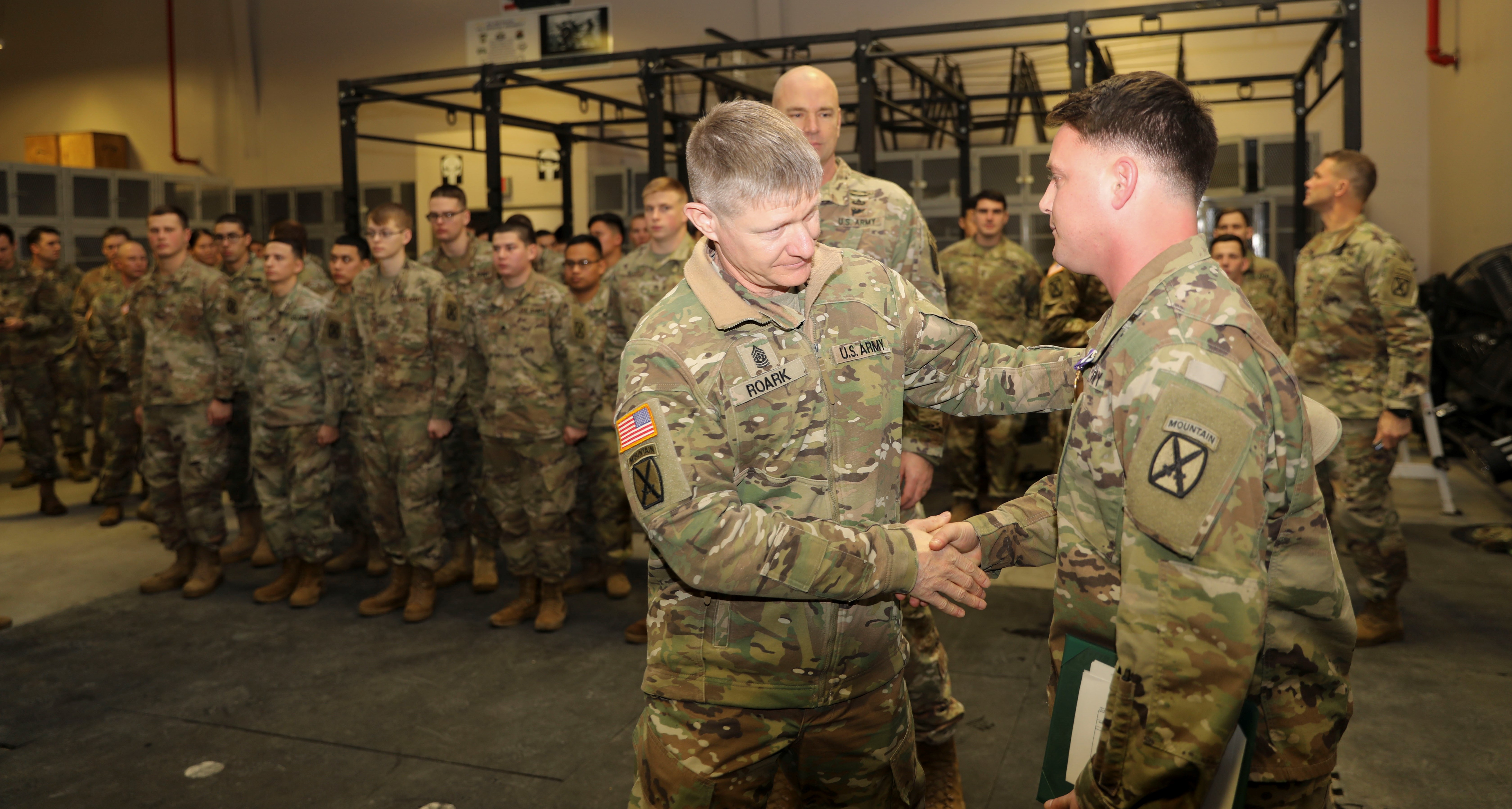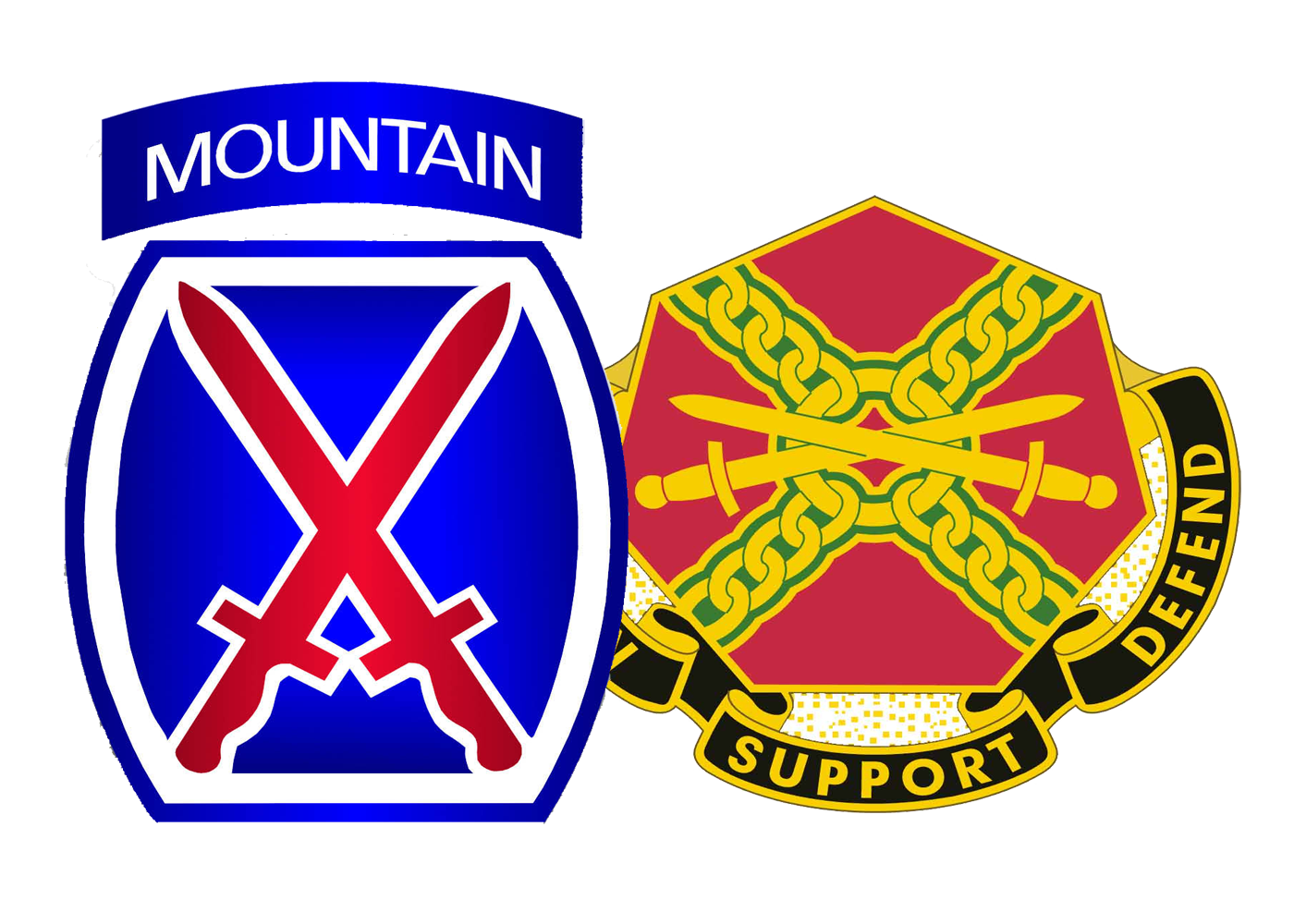
Command Sgt. Maj. Samuel Roark, 10th Mountain Division (LI) senior enlisted adviser (far right) conducts physical training at one of the training facilities at Fort Drum, N.Y. After 30 years of service, Roark is preparing to embrace the changes to come with his retirement after the change of responsibility ceremony March 18 on post. (Photo by 10th Mountain Division PAO)
Retiring senior enlisted leader proud
to have worn 10th Mountain Division patch
Mike Strasser
Fort Drum Garrison Public Affairs
FORT DRUM, N.Y. (March 18, 2020) – After 30 years of service, Command Sgt. Maj. Samuel Roark is ready to embrace the changes to come after retiring as the senior enlisted leader for the 10th Mountain Division (LI).
“There comes a time in everyone’s career when you simply have to move on to what’s next,” he said. “My thoughts are that you have to accept the change, understand it and embrace what comes next.”
However, that didn’t keep him away from training with Soldiers during the recent Mountain Peak field exercise in blizzard-like conditions, or stop him from knocking out leg tucks and deadlifts as units continue preparing for the Army Combat Fitness Test.
“I always thought the hardest thing for me would be to come to a point where I was physically unable or slowing down, but since I’m not there yet, thinking about retirement has been a little bit different for me,” Roark said.
He said that when he first put on the 10th Mountain patch it was in the back of his mind that this might be the last one he would wear. So he planned for life after the Army the best he could, but after 30 years in the Army, Roark said that it is hard to fully know what the first day will be like when he isn’t in uniform.
“It sounds funny, but if you wake up in the morning and do some PT, eat some breakfast, drink your coffee and think about what you have to do next, it’ll all work out,” he said.
Roark arrived at Fort Drum in late 2017 to assume responsibility of the 10th Mountain Division (LI) as its senior enlisted adviser.
Even for a seasoned noncommissioned officer and leader, highly decorated with multiple deployments under his belt, Roark said that he knew this final assignment was going to be a special one.
“When I first got here, I realized what a privilege it was to be selected as the 10th Mountain Division’s command sergeant major,” he said. “That alone is incredible, but then when you look back at the 10th Mountain Division history and everything that it has done, it’s pretty significant.”
From its origins as an elite mountaineer unit during World War II to its continual support of operations overseas since 9/11, Roark said that the gravitas of the mission was one he knew had to be done right.
“I didn’t realize how tremendous the reputation of the 10th Mountain Division is, and when I first got here, I didn’t realize how much of my time would be spent upholding that reputation because our country and the American people count on us,” he said. “When you look at all of that, you really start reflecting about the actual responsibility that you have to make sure that they have the best training and that you are taking care of them and their families. Then you just get after it and say, ‘Let’s get to work.’”
Roark said that after spending much of his career in places like Fort Benning and Fort Stewart, Georgia, and arriving at Fort Drum from Fort Knox, Kentucky, he welcomed the change in climate.
“I have no problems with snow, and I actually like the winters here,” he said. “What I don’t care for is the heat and humidity anymore, so I enjoyed my time here. As far as Fort Drum goes, this is one of the better installations for facilities that I have seen.”
He noted that the infrastructure at Fort Drum was built in the 1980s to become home for the reactivated 10th Mountain Division and was deliberately planned to integrate its population into the surrounding communities.
“That’s what people don’t always know when they come here,” Roark said. “The attachment and the connections this installations has with the outside community, and how the installation supports the community – it’s a relationship that goes both ways. The people here are good; they actually care and support what we do, out of the goodness of their hearts.”
A few short months after his arrival, Roark deployed to Iraq as part of the Combined Joint Forces Land Component Command for Operation Inherent Resolve.
“When you talk about deploying in a short amount of time, my mind automatically goes to prioritizing,” he said. “What do I need to do first, then what do I need to do after that. That’s just the pace of the 10th Mountain Division, and it happens to every Soldier.”
He said that depending on when a new Soldier arrives, he or she could be inserted into a brigade either preparing for a Mountain Peak training exercise, a JRTC (Joint Readiness Training Center) rotation or a deployment.
In terms of professionally rewarding experiences, Roark reflected back to his time at Fort Stewart, from 1995 to 2000 with A Troop, 3rd Squadron, 7th Cavalry Regiment.
“I worked with some good noncommissioned officers there, and that’s where I met my first mentor,” he said. “I would say that one of the reasons I got selected for this job with the 10th Mountain Division was because of that duty station. It wasn’t easy; I mean, we trained all the time.”
Roark said that having mentors and seeking knowledge from the experience of others is critical for young NCOs.
“A young man or woman can be headstrong and, sometimes, they don’t see the long term,” he said. “That’s what a mentor can do for you. They look at things differently, and that’s especially important as a noncommissioned officer in the Army.”
Roark said that a lesson learned that he found most valuable in his career is essentially the ancient Greek maxim: “Know thyself.”
“It’s about really understanding how, personally, I react to situations and how my reactions to situations can affect or control other people’s reactions,” he said. “You have to really understand yourself personally, and also professionally, to be a good leader. If not, you will quickly lose control of the situation.”
Following his assignment at Fort Stewart (the first of three at that location) Roark completed a stint as a drill sergeant with D Company, 1st Battalion, 34th Infantry Regiment at Fort Jackson, South Carolina. From training new recruits on how to be Soldiers, Roark then assumed the responsibilities of a scout platoon sergeant with A Troop, 3rd Squadron, 4th Cavalry Regiment at Schofield Barracks, Hawaii.
“That experience was rewarding in that I was given the latitude to train my platoon – for me, that was training individual tasks and small team proficiency, and my platoon leader did the platoon collective tasks,” he said. “We did that up until our first deployment to Afghanistan, right after the 10th Mountain Division did. And you could tell that the training paid off in everything that we did.”
He recalled those early rotations where troops make do in austere conditions with little creature comforts.
“But we were actually really ready for that because of what we did to prepare for deployment,” Roark said. “A lot of things I did and learned with that unit helped set me up for success here.”
He continued the typical career progression of an NCO, while graduating from each of the Army’s professional education schools to include the U.S. Army Sergeant Major Academy. He earned a master’s degree in management and leadership from Webster University. That pursuit of lifelong learning is something Roark advocated to other Soldiers.
“A lot of Soldiers come into the Army for opportunities they can’t find elsewhere,” he said. “For whatever reason, they let actions or situations move them away from pursuing them. I have all my higher education because of the Army. I’ve said many times that I have a master’s degree and all I had to pay for is books. But you have to make it your priority.”
Roark said that regardless of Soldiers’ length in service, they should seize every opportunity to better themselves for life after the Army.
“Your Army service is really only a small portion of your life, for most people,” he said. “But you can use that small portion to set you up for so much more later in life. If you are seeking it out, striving for those educational opportunities, it’s going to make you a better Soldier too.”
Roark served alongside his wife Deanna, who has been an active and positive presence in the Fort Drum community since their arrival.
“Her role in the community has been really important and I, for one, appreciate everything she has done,” he said. “The pace can be crazy for a 10th Mountain Division Soldier, so I think the community needs to see from their command group that strong family relationships exist. They need to see that even though the pace is crazy and you are gone all the time, that the time you do have together is quality time and that it’s meaningful.”
Roark said that they consider the social events they attend together, whether it’s a volunteer appreciation event or a monthly observation, as their “date nights.”
“That’s usually the first time we see each other all day,” he said. “But it’s the little things and those moments we can spend together that matter a lot. Like in the morning, we make a distinct effort to drink a cup of coffee together.”
Roark said that it has been a pleasure to interact with division Soldiers for the past two years, whether it was on a training range, during a physical training session or just in passing around the installation.
“How you help certain individuals accomplish what they want to accomplish – that’s what it boils down to and that’s what I found most enjoyable,” he said. “In the past several weeks, I helped one noncommissioned officer get a job that he really wanted, and I’ve helped a couple others with assignments. That’s what made it all worthwhile.”





